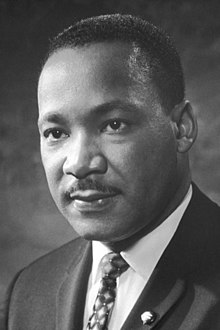Martin Luther King Jr.
| Martin Luther King Jr. | |
|---|---|

King in 1964
| |
| Born | Michael King Jr. January 15, 1929 Atlanta, Georgia, United States |
| Died | April 4, 1968 (aged 39) Memphis, Tennessee, United States |
| Cause of death | Assassination |
| Monuments | Martin Luther King Jr. Memorial |
| Alma mater | |
| Occupation | Clergyman, activist |
| Organization | Southern Christian Leadership Conference (SCLC) |
| Movement | African-American Civil Rights Movement, Peace movement |
| Religion | Christianity (Baptist (Progressive National Baptist Convention)) |
| Spouse(s) | Coretta Scott King (m. 1953–68; his death) |
| Children |
|
| Parent(s) | |
| Awards |
|
| Signature | |
 | |
Martin Luther King Jr. (January 15, 1929 – April 4, 1968) was an American Baptist minister and activist who was a leader in theAfrican-American Civil Rights Movement. He is best known for his role in the advancement of civil rights using nonviolent civil disobedience based on his Christian beliefs.
King became a civil rights activist early in his career. He led the 1955 Montgomery bus boycott and helped found the Southern Christian Leadership Conference (SCLC) in 1957, serving as its first president. With the SCLC, King led an unsuccessful 1962 struggle against segregation in Albany, Georgia (the Albany Movement), and helped organize the 1963 nonviolent protests inBirmingham, Alabama. King also helped to organize the 1963 March on Washington, where he delivered his famous "I Have a Dream" speech. There, he established his reputation as one of the greatest orators in American history.
On October 14, 1964, King received the Nobel Peace Prize for combating racial inequality through nonviolent resistance. In 1965, he helped to organize the Selma to Montgomery marches, and the following year he and SCLC took the movement north to Chicago to work on segregated housing. In the final years of his life, King expanded his focus to include opposition towardspoverty and the Vietnam War, alienating many of his liberal allies with a 1967 speech titled "Beyond Vietnam".
In 1968, King was planning a national occupation of Washington, D.C., to be called the Poor People's Campaign, when he wasassassinated on April 4 in Memphis, Tennessee. His death was followed by riots in many U.S. cities.
King was posthumously awarded the Presidential Medal of Freedom and the Congressional Gold Medal. Martin Luther King Jr. Day was established as a holiday in numerous cities and states beginning in 1971, and as a U.S. federal holiday in 1986.Hundreds of streets in the U.S. have been renamed in his honor, and a county in Washington State was also renamed for him. The Martin Luther King Jr. Memorial on the National Mall in Washington, D.C., was dedicated in 2011.
No comments:
Post a Comment